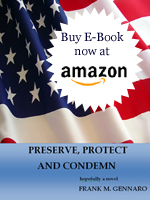FRANK ON FRIDAY – Trump Hits a Bump
It’s no secret that I’m a Ted Cruz supporter. As I write this, the latest poll from Wisconsin has Cruz up by 10 points. Let’s hope it’s right. During the primary battles, I have been trying hard to keep an open mind about Donald Trump. My thinking has been, and continues to be, that, should Trump become the nominee, I couldn’t sit idly by and let Hillary Clinton be elected President; I’d have to support Trump. That distasteful prospect may yet come to pass, but it is becoming progressively more difficult to convince myself that Trump might not be so bad, if it comes to that. It is because of the likelihood that Trump might be the nominee that I have striven to avoid blatant criticism of him. In this I have failed. It has long been all too apparent that, where Trump is concerned, there’s really no “there” there. I’m talking about depth of principles and substance on the issues. What we’ve gotten plenty of is, “I’ll make a deal” and “It will be great!” Coming either from Monte Hall or Tony the Tiger, these would be perfectly acceptable offerings. Coming as they do from someone who wants to be President of the United States, they are not. Donald Trump likes to compare himself to Ronald Reagan. Please. A comparison of the two is not flattering to Trump. Ronald Reagan liked to say that he was a big picture guy, and not a detail guy. He took a lot of flak for that, unfairly, I think. You see, Jimmy Carter was a detail guy. Like most experts, Carter knew more and more about less and less until eventually, he knew everything about nothing. Despite knowing all the details, Carter got nothing done. Reagan didn’t know all the details. He didn’t pretend to know them. Indeed, Reagan didn’t need to know the details, because he knew what he believed. Reagan had guiding principles. He saw the big picture, and his policies reflected the principles that motivated his decision to enter public service. Donald Trump knows only one thing – he has a desire to be President. If there is some underlying principle, moral, or political philosophy motivating Trump’s candidacy, then he either hasn’t mentioned it, or doesn’t know how to do so. I think the truth is more disturbing. Trump really doesn’t know what he believes about the issues, he only knows what he’s heard about them. Simply put, Trump doesn’t think the issues are important, so why learn about them? Indeed, why care about them? After all, Trump keeps reminding us that he’s not a politician. That’s part of his appeal, of course, but even if you’re not a politician (a neat trick for a President), since you will be the person who is responsible for making policy on these issues, shouldn’t you be able to articulate some coherent position? Trump can’t. Almost without exception, when he speaks to an issue, his answers are confusing, contradictory, or downright nonsensical. Where does Trump stand on foreign tariffs? The tariff will be 45%; maybe less than that; maybe no tariffs at all, I could just be bluffing (don’t tell the Chinese). Trump says two of the the three most important functions of the federal government are healthcare and education. Nothing in the U.S. Constitution about either of those two things? No matter. What about healthcare Mr. Trump? “Obamacare … very bad.” “Healthcare should be privately done.” You just said, the government. “Well, privately done, but the government will lead it.” Huh? On education, I thought you were against Common Core. “I am.” But you said education is a federal government function. “I want it to go to state, yes. Absolutely. I want – right now…” I repeat, huh? Now, Mr. Trump, you said you want Japan and South Korea to have nuclear weapons, so you’re in favor of nuclear proliferation? “No, no, not proliferation.” But that’s proliferation. “Now, wouldn’t you rather in a certain sense have Japan have nuclear weapons when North Korea has nuclear weapons?” So you’re saying you don’t want more nuclear weapons in the world but you’re OK with Japan and South Korea having nuclear weapons? “I don’t want more nuclear weapons.” This exchange proved confusing, even for Anderson Cooper. You see, Mr. Trump wants to use a corporate, not a diplomatic strategy for foreign affairs. It’s often been suggested that the government should be run like a business, and Donald Trump is just the man to do it. We don’t spend enough for defense, but we spend too much defending our allies, like Germany, South Korea and Japan. We need to build up the military, but it’s time to cancel or change NATO, because it’s a bad financial deal for us. I’ve got it. We will run the government like a business. The United States is not the world’s policeman, but we will sell our protection to our allies, who should pay to defend themselves. The same allies we just crippled economically with the 45% tariffs, or was it 35%? Nah, just bluffing (don’t tell the Chinese). If none of this makes sense to you it’s only because nothing Trump says amounts to a recognizable, reasonable and defensible position on anything. Abraham Lincoln said “you can fool some of the people all of the time.” The trouble is that Trump can’t fool enough of the people to win election, and woe betide America if he could. Donald Trump must not be the nominee of our Party.

Leave a Reply